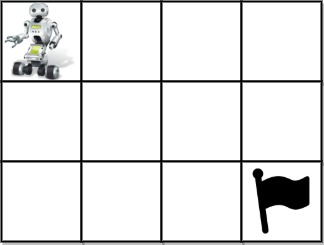Description
You are given an m x n integer array grid where grid[i][j] could be:
1representing the starting square. There is exactly one starting square.2representing the ending square. There is exactly one ending square.0representing empty squares we can walk over.-1representing obstacles that we cannot walk over.
Return the number of 4-directional walks from the starting square to the ending square, that walk over every non-obstacle square exactly once.
Example 1:

Input: grid = [[1,0,0,0],[0,0,0,0],[0,0,2,-1]] Output: 2 Explanation: We have the following two paths:
- (0,0),(0,1),(0,2),(0,3),(1,3),(1,2),(1,1),(1,0),(2,0),(2,1),(2,2)
- (0,0),(1,0),(2,0),(2,1),(1,1),(0,1),(0,2),(0,3),(1,3),(1,2),(2,2)
Example 2:

Input: grid = [[1,0,0,0],[0,0,0,0],[0,0,0,2]] Output: 4 Explanation: We have the following four paths:
- (0,0),(0,1),(0,2),(0,3),(1,3),(1,2),(1,1),(1,0),(2,0),(2,1),(2,2),(2,3)
- (0,0),(0,1),(1,1),(1,0),(2,0),(2,1),(2,2),(1,2),(0,2),(0,3),(1,3),(2,3)
- (0,0),(1,0),(2,0),(2,1),(2,2),(1,2),(1,1),(0,1),(0,2),(0,3),(1,3),(2,3)
- (0,0),(1,0),(2,0),(2,1),(1,1),(0,1),(0,2),(0,3),(1,3),(1,2),(2,2),(2,3)
Example 3:

Input: grid = [[0,1],[2,0]] Output: 0 Explanation: There is no path that walks over every empty square exactly once. Note that the starting and ending square can be anywhere in the grid.
Constraints:
m == grid.lengthn == grid[i].length1 <= m, n <= 201 <= m * n <= 20-1 <= grid[i][j] <= 2- There is exactly one starting cell and one ending cell.
Code
class Solution {
public:
int uniquePathsIII(vector<vector<int>>& grid) {
int startI, startJ;
int n = grid.size();
int m = grid[0].size();
for(int i = 0; i < n; i++) {
for(int j = 0; j < m; j++) {
if(grid[i][j] == 1) {
startI = i;
startJ = j;
break;
}
}
}
return search(startI, startJ, grid);
}
int search(int x, int y, vector<vector<int>>& grid) {
if(x >= grid.size() || x < 0 || y >= grid[0].size() || y < 0) return 0;
if(grid[x][y] == 3 || grid[x][y] == -1) return 0;
if(grid[x][y] == 2) {
for(int i = 0; i < grid.size(); i++) {
for(int j = 0; j < grid[i].size(); j++) {
if(grid[i][j] == 0) return 0;
}
}
return 1;
}
// Backtracking
int temp = grid[x][y];
grid[x][y] = 3;
int res = search(x + 1, y, grid) + search(x - 1, y, grid) + search(x, y + 1, grid) + search(x, y - 1, grid);
// Backtracking
grid[x][y] = temp;
return res;
}
};